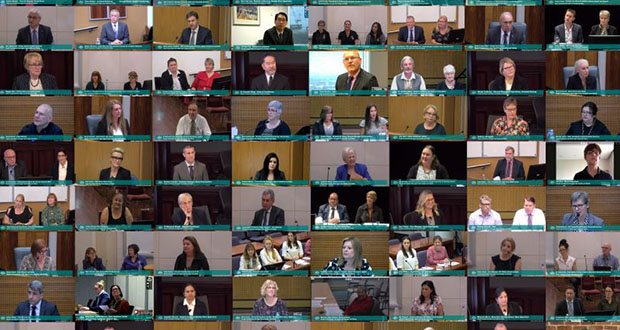The Royal Commission into Aged Care Quality and Safety has sat for 55 days so far, calling 296 witnesses. Of those, 85 per cent have given testimony on issues concerning the aged care workforce, with 113 witnesses providing their perspective on working day-to-day in aged care.
The third Melbourne hearing got underway with a video montage of some of these witness' testimonies:
We need more people on the floor and we want those people to be trained…”
"I would look after 20–60 residents … so we can’t give the time and attention that each person deserves…”
"Half the time I would go and visit dad and there’s no one to be seen …”
"She used the diaper and I said, ‘mum why didn’t you ring the bell?’ and she said ‘I did ring the bell, but nobody came’”
"For the work that we do, the pay doesn’t reflect that, at all.”
"All the duties that we had to do in the time that was allocated, there wasn’t time and we were discouraged from developing relationships…”
Counsel assisting Peter Rozen told those attending that the aged care workforce – which stands at 366,000 – has seen a declining number of nurses in the ranks.
“In 2003, as can be seen, 35.8 per cent of the workforce were nurses. By 2016, this had declined to 24.2 per cent. So, from over a third to under a quarter,” he said.
This point was backed up by Professor Kathy Eager, director at the Australian Health Services Research Institute. She believes that due to economic pressures the industry has been “deskilled”.
“I think it’s a combination, but I think it has been an unholy set of interests that have come together to have a deskilled workforce,” she said.
“I think the reduction in health professionals has been largely economic.”
Eager also told the commission that due to this skills shortage, residents are often moved to hospital emergency departments rather than be cared for at the facility. She also went further on her comments about the economics of the sector, suggesting that the care side of aged care should not be profited from.
“I would make two remarks. The first is that the ACFI is no longer fit for purpose and so maintaining the current funding model but just throw a bit more money at the problem will not solve the problem,” she said.
“The second issue is that one of the things that is missing in this sector is a policy on the relationship between cost and price. And by that, I mean if you think about the way residential aged care is funded, there’s an accommodation stream and there’s a hotel stream and there’s a care stream. It would be quite reasonable to argue that government funding for care should actually be invested in care, and that care is not a profit stream.
“If we had a system that ensured that all care funding was actually invested in care, it would be a very different sector,” she said.
Chair of the aged care workforce strategy taskforce, John Pollaers, spoke about a number of reasons for workforce issues, including the fragmented nature of the various bodies representing the sector.
“There are very many peak bodies that lay some claim to representing this sector… there’s more peaks in this industry than there is in a small mountain range,” he said.
“At the outset ... there was lots of different groups that didn’t have a lot of time for each other, hadn’t taken the time to listen to each other’s opinions and points of view so – and in many ways locked into a contest between government, industry and the unions, without really involving the community or the residents and the consumers themselves.”
Pollaers was less than complimentary of the way government chose to engage with the industry – which he describes as “adolescent” – telling the commission that he felt the “department or the minister’s office” would do things to keep the industry fragmented and “divided” so it was “easier” to deal with.
Pollaers also told the commission that attraction and retention were key to any workforce strategy going forward, and the responsibility for this task lies with government, the community and the industry as a whole.
“There has to be a very proactive approach to a social change campaign around ageing in Australia,” he said.
Do you have an idea for a story?Email [email protected]
 Aged Care Insite Australia's number one aged care news source
Aged Care Insite Australia's number one aged care news source

